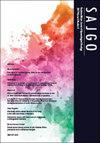The impact of HIV infection on women receiving radiation for cervical cancer
IF 0.1
Q4 OBSTETRICS & GYNECOLOGY
Southern African Journal of Gynaecological Oncology
Pub Date : 2015-07-03
DOI:10.1080/20742835.2015.1083697
引用次数: 11
Abstract
Abstract Background: The objective of the study was to compare patient characteristics, treatment toxicity and interruptions, and survival in human immunodeficiency virus (HIV)-positive and HIV-negative cervical cancer patients receiving radiation as primary or adjuvant treatment. Method: Demographics, clinical and tumour characteristics, and the outcomes of 51 HIV-positive and 47-HIV negative consecutive cervical cancer patients were assessed and compared, including co-morbidities, performance status, treatment type and toxicities, and survival. Results: HIV-positive women were 13 years younger (p < 0.001), more often had anaemia (p 0.021) and needed pretreatment blood transfusion (p 0.037) more often than HIV-negative women. Performance status, kidney function, International Federation of Gynecology and Obstetrics stage, histology types and treatment intent and planning did not differ between the two groups. Treatment interruptions (p 0.004), transfusion during treatment (p 0.012), treatment toxicities (p 0.040) and average deficit (p 0.021) occurred significantly more in HIV-positive patients. Survival was significantly worse in HIV-positive women (p 0.029) and was associated with insufficient radiation (p < 0.001) and treatment interruptions (p 0.051). Conclusion: In spite of being younger, the pretreatment correction of anaemia and the prescription of sufficient radiation dosages, HIV-infected cervical cancer patients experienced poorer survival. Treatment interruption and incomplete radiation contributed to poor outcomes.艾滋病毒感染对接受宫颈癌放射治疗的妇女的影响
背景:本研究的目的是比较人类免疫缺陷病毒(HIV)阳性和HIV阴性宫颈癌患者接受放射作为主要或辅助治疗的患者特征、治疗毒性和治疗中断以及生存率。方法:对51例hiv阳性和47例hiv阴性连续宫颈癌患者的人口统计学、临床和肿瘤特征及转归进行评估和比较,包括合并症、表现状况、治疗类型和毒副作用、生存期。结果:hiv阳性妇女比hiv阴性妇女年轻13岁(p < 0.001),更常发生贫血(p 0.021),更常需要预处理输血(p 0.037)。两组患者的运动状态、肾功能、国际妇产联合会分期、组织学分型、治疗意图和治疗计划均无差异。治疗中断(p 0.004)、治疗期间输血(p 0.012)、治疗毒性(p 0.040)和平均缺陷(p 0.021)在hiv阳性患者中显著增加。hiv阳性妇女的生存率明显较差(p 0.029),并且与放疗不足(p < 0.001)和治疗中断(p 0.051)有关。结论:hiv感染的宫颈癌患者尽管年龄较轻,贫血的预处理纠正和足够的放射剂量处方,但生存率较低。治疗中断和不完全放疗导致预后不良。
本文章由计算机程序翻译,如有差异,请以英文原文为准。
求助全文
约1分钟内获得全文
求助全文
来源期刊

Southern African Journal of Gynaecological Oncology
OBSTETRICS & GYNECOLOGY-
自引率
0.00%
发文量
0
审稿时长
24 weeks
 求助内容:
求助内容: 应助结果提醒方式:
应助结果提醒方式:


